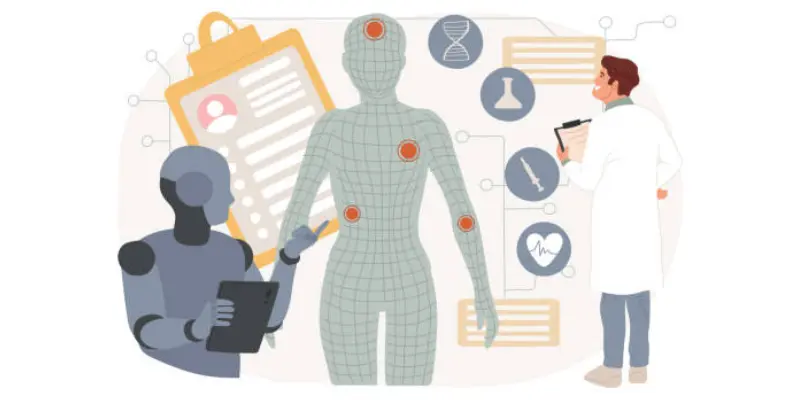How AI is Transforming Precision Medicine for Better Health
Published: 5 Jun 2025
Did you know that over 90% of the world’s data was created in just the last two years? That includes medical records, lab results, genetic tests and even data from your fitness watch! Now imagine if we could use all that information to give each person the best possible treatment. That’s exactly what AI precision medicine is doing.
Precision medicine means giving the right treatment to the right person based on their unique body and lifestyle. And when we add artificial intelligence (AI), it becomes faster, smarter and more accurate.
In this post, we will break down how AI helps doctors make better decisions. Don’t worry, it’s all in simple words and easy steps. Let’s explore how AI is making healthcare more personal and powerful.

What is Precision Medicine?
In the past, doctors often gave the same treatment to everyone with the same illness. But not all bodies react the same way. One medicine might help one person and hurt another.
Precision medicine changes that. It looks at what makes you different like your genes, lifestyle and even where you live. Then, it helps doctors choose a treatment that fits you best.
Old Way vs. New Way
- Old Way: One treatment for everyone
- New Way: Personalized care for each patient
Let’s say two people have the same type of cancer. Precision medicine helps doctors find out which drug works better for each person based on their body’s data.
What Makes It Precise?
- It uses your DNA (your genetic blueprint)
- It checks your daily habits (like diet, sleep and activity)
- It considers your environment (like pollution or stress levels)
This way, treatments become more targeted, safe, and effective.
How AI Powers Precision Medicine
So, how does AI actually help in precision medicine? Think of it as a digital brain that works non-stop. It looks at huge piles of health data like your test results, family history and even your smartwatch activity and finds useful patterns faster than any doctor could.
Let’s break it down step by step.
1. AI Analyzes Big Health Data
In healthcare, there’s a lot of data in the form of millions of medical records, lab results, X-rays and genetic codes. It’s more than any human can handle.
AI looks at this data quickly and carefully. It spots patterns, compares results and finds connections we might miss.
Real-life example:
In a large-scale study in Germany, AI-assisted mammography screening improved breast cancer detection rates by 17.6% without increasing false positives.

2. AI Makes Smart Predictions
Once AI finds patterns, it can predict health problems before they happen. It can also suggest the best treatments for each person.
This helps in many ways:
- Spotting diseases early
- Reducing trial and error in treatments
- Preventing serious side effects
Real-life example:
Researchers at Imperial College London developed an AI model that predicts the risk of heart disease and early death using electrocardiogram (ECG) data. This tool helps doctors identify at-risk patients earlier, allowing for timely interventions.
3. AI Recommends Personalized Treatments
Not all patients respond the same way to drugs. Some get better. Others get worse.
AI uses a person’s DNA, lifestyle and past medical results to help in choosing the right medicine. It can also tell how much of it is safe for that person.
Real-life example:
The NHS in England has introduced a revolutionary blood test that uses AI to detect cancer by identifying circulating tumor DNA in the bloodstream. This approach allows for earlier and more targeted treatments, benefiting thousands of patients annually.
4. AI Learns and Gets Smarter Over Time
The more information AI receives, the better it gets. This is called machine learning.
As new health data is added:
- AI adjusts its suggestions
- It finds newer, better patterns
- It helps doctors stay up to date
So, instead of giving the same answer every time, AI grows and improves just like a doctor gains experience.
Also Read: How AI can Help in Sex Change
Real-Life Examples of AI in Precision Medicine
Seeing AI work in real hospitals and clinics helps us understand how it’s changing medicine. Here are some clear examples where AI is making a real difference today.
1. AI Helps Detect Cancer Earlier
Doctors use AI tools to read medical images like X-rays and mammograms. AI can spot tiny signs of cancer that may be missed by the human eye. This leads to earlier diagnosis and treatment.
For example, Google’s DeepMind developed an AI system that reads breast cancer scans. In studies, it found cancer cases earlier and lowered false alarms. This helps doctors catch the disease sooner and gives patients a better chance to recover.

2. AI Predicts Heart Problems Before They Happen
Heart disease is a leading cause of death worldwide. AI helps by analyzing heart tests and patient records to predict who might be at risk.
Stanford researchers created an AI tool that looks at electrocardiogram (ECG) data and predicts heart failure risk. This lets doctors act early, give treatments faster and potentially save lives.
By predicting problems before symptoms appear, AI helps people get the care they need sooner.
3. AI Personalizes Cancer Treatment
Every patient’s cancer is unique. AI helps doctors to choose the best drug and dose by analyzing a patient’s genes and medical history.
IBM Watson for Oncology is an AI system that reviews data from thousands of cancer cases worldwide. It then suggests personalized treatment plans that match a patient’s specific tumor type and genetics.
This helps doctors avoid guesswork and choose safer options and improve patient outcomes.
4. AI Supports Patients with Chronic Diseases
Living with long-term illnesses like diabetes can be tough. AI-powered apps now help patients manage their health daily.
For example, the MySugr app uses AI to track blood sugar levels, meals and activity. It gives personalized tips to keep blood sugar stable, making it easier to control diabetes and avoid complications.
This kind of AI supports and empowers patients to take charge of their health between doctor visits.
What Can You Take Away?
AI is not just a futuristic idea it’s helping real patients in real ways. From spotting cancer early to managing chronic illness, AI makes healthcare smarter and more personal.
Have you tried any health apps or heard about AI in medicine before? How do you think AI could help you or your family? Share your thoughts!
Benefits of AI Precision Medicine
AI is changing the way doctors care for patients. Here’s how AI improves precision medicine with clear benefits:
| Advantages |
|---|
|
Challenges of AI Precision Medicine
AI brings many benefits but there are some challenges we need to know about. Here are the main hurdles in using AI for precision medicine:
| Disadvantages |
|---|
|
Future of AI in Precision Medicine
AI in precision medicine is still growing. Let’s explore what’s coming next and how it will change healthcare even more.
What’s Coming Next?
- Smarter Algorithms
AI will become better at understanding complex health data. These smarter systems will give even more accurate diagnoses and treatment plans. - Global Databases
More countries and hospitals will share health data safely. This big global pool will help AI learn faster and work for more people worldwide.
AI + Genomics + Wearables
- Real-Time, Personal Health Tracking
AI will combine information from your genes (genomics) and devices like smartwatches. This means it can watch your health every moment and notice changes early. - Personalized Health Advice
Based on this real-time data, AI will give you tips to stay healthy or warn you if something needs attention.
Example:
Imagine your smartwatch sending data to an AI system. The AI notices your heart rate is higher than usual and suggests simple exercises or a doctor’s visit. In this way, you get health help exactly when you need it.
Conclusion
AI is changing precision medicine in amazing ways. It helps doctors find diseases earlier, choose the best treatments and keep patients healthier. Though there are challenges like privacy and cost, the future looks bright with smarter AI and new technology like wearables.
Imagine a world where your health is watched closely and your treatment fits you perfectly. That’s the promise of AI in precision medicine. Are you ready to see how AI can help you or your loved ones stay healthier?
AI Precision Medicine: Frequently Asked Questions
Here are the FAQs about AI Precision Medicine:
The cost varies depending on your insurance and healthcare system. Many AI-assisted tests and diagnoses are gradually being covered by insurance plans. While some advanced genetic testing may still be expensive, basic AI tools are becoming more affordable as the technology spreads.
Healthcare providers must follow strict privacy laws like HIPAA to protect your data. Your personal information is usually encrypted and anonymized before AI systems analyze it. However, you should always ask your doctor about their data security practices and read privacy policies carefully.
Yes, AI can make mistakes just like human doctors can. That’s why AI is designed to assist doctors, not replace them completely. Your doctor will always review AI recommendations and use their medical expertise to make the final decision about your care.
Not necessarily – AI can often work with standard tests you already get like blood work or X-rays. Some advanced precision medicine may require genetic testing which involves a simple blood or saliva sample. Your doctor will recommend what’s appropriate for your specific situation.
AI can analyze data much faster than traditional methods, often within minutes or hours. However, the total time depends on what tests are needed and your healthcare system’s processes. Some results may be available the same day while others might take a few days to be reviewed by your doctor.
Yes but with special considerations for each age group. Children’s bodies are still developing, so AI needs pediatric-specific data to make accurate predictions. For elderly patients, AI can be especially helpful in managing multiple health conditions and avoiding dangerous drug interactions.
You typically have the right to opt out of AI-assisted care in most healthcare systems. However, this might limit some diagnostic options or treatment recommendations available to you. It’s best to discuss your concerns with your doctor to understand the pros and cons.
No, not all healthcare facilities have adopted AI technology yet. Larger hospitals and specialized medical centers are more likely to have AI tools available. The availability depends on factors like funding, training and local healthcare infrastructure.
Yes, AI is increasingly being used for mental health by analyzing patterns in speech, behavior and even social media activity (with consent). It can help identify early signs of depression, anxiety or other conditions. However, human therapists and psychiatrists remain essential for treatment and emotional support.
You can simply ask your healthcare provider if they use AI tools in their practice. Many doctors will mention it when discussing test results or treatment options. You have the right to know what technologies are being used in your care and how they might affect your treatment decisions.





